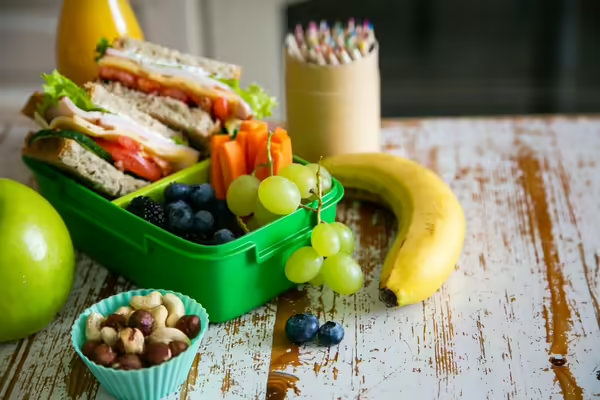
As the school year kicks off, evenings quickly fill with homework, sports practices, activities, and looming deadlines. With so much on your plate, dinner shouldn’t be another source of stress. The good news? A little weekend prep can help you sail through the week with healthy, low-stress meals that keep your family fueled and focused.
Meal Prep Tips for a Smooth Week:
- Plan Ahead: Set aside one day to plan and prep meals for the week. Chop veggies, cook a large batch of grains, shred some chicken, or simmer a pot of chili. Pre-portioning ingredients and storing them in the fridge makes it easy to throw meals together—even on the busiest nights.
- Cook Once, Eat Twice: Double batches are your best friend. Freeze leftovers or repurpose them into the next day’s lunch. Think roast chicken on Monday, chicken quesadillas on Tuesday. Shortcuts like rotisserie chicken, frozen veggies, and canned beans save time without sacrificing nutrition.
- Build-Your-Own Nights: Make meals more fun (and picky-eater-friendly) with DIY options like taco bars, pasta bowls, or baked potato bars. Customizing meals keeps everyone happy—and dinner on the table faster.
- Don’t Forget the Snacks: Keep a stash of grab-and-go options like yogurt parfaits, energy bites, veggie sticks with hummus, or apple slices with peanut butter. They’re perfect between school and evening events or as a healthy bedtime snack.
With a bit of planning, a stocked fridge, and flexible routines, weeknight meals can become a bright spot in your day rather than a burden. Give yourself the gift of a little prep—and enjoy more time around the table and less time in the kitchen.
Waste-Free Lunches: Small Changes, Big Impact
Every day, food, packaging, and plastic utensils from lunches end up in the trash—and in landfills. In fact, 40% of food in the U.S. goes uneaten, wasting billions of dollars and valuable natural resources. Meanwhile, plastics and paper from lunch packaging contribute to the country’s growing waste problem.
Packing a waste-free lunch—with reusable containers, cloth napkins, and food your family will actually eat—can help cut down on waste and save money. Compared to a typical disposable lunch, you could save over $240 per year with a waste-free approach.
Ready to reduce waste and make lunch more sustainable?
Check out the Zero Waste Guide for tips and ideas:
University of Illinois Extension develops educational programs, extends knowledge, and builds partnerships to support people, communities, and their environments as part of the state's land-grant institution. Extension serves as the leading public outreach effort for University of Illinois Urbana-Champaign and the College of Agricultural, Consumer and Environmental Sciences in all 102 Illinois counties through a network of 27 multi-county units and over 700 staff statewide. Extension’s mission is responsive to eight strategic priorities — community, economy, environment, food and agriculture, health, partnerships, technology and discovery, and workforce excellence — that are served through six program areas — 4-H youth development, agriculture and agribusiness, community and economic development, family and consumer science, integrated health disparities, and natural resources, environment, and energy.